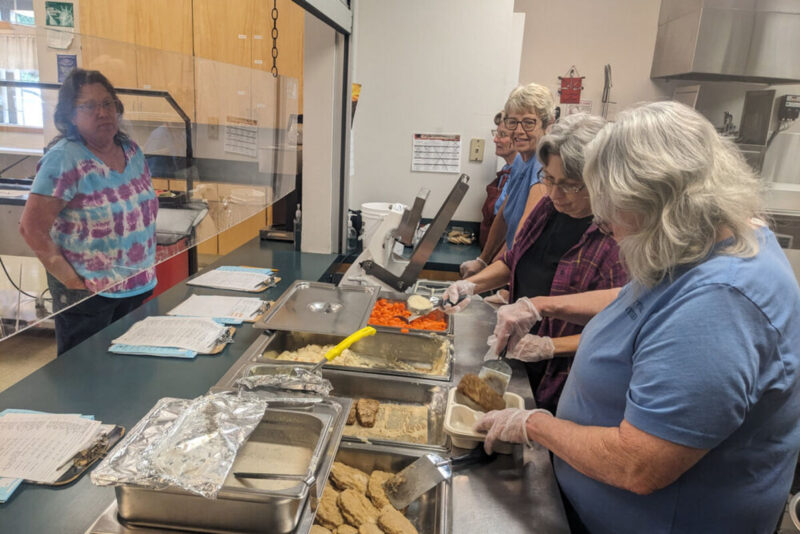Sarah Brown
Jean Kuhns, a delivery driver for Meals on Wheels (MOW), knocks on a door and is greeted by two big dogs who have become familiar with her regular visits. She hands a sealed hot food tray to the man at the door and notices he has a scab on his nose.
“Are you okay,” she asks him, to which he explains he had a dizzy spell and fell.
Some time back, this man told her he hadn’t eaten since her last delivery because his car broke down and he had no way to get to the store. It’s opportunities like this – to make sure people are getting by okay – that Kuhns appreciates.
MOW, under the umbrella of Oregon Cascades West Council of Governments (OCWCOG), is a hot food delivery service for seniors who are often homebound and have zero to few other options for obtaining nutritious food, but it also acts as a welfare check for many of them.
“The program helps seniors to stay in the communities where they have established roots so they can enjoy the kind of personal connections that will help them thrive and live the independent lives they deserve,” OCWCOG Communications Officer Meg Walker said. The program recently felt a bit strained by a shortage of volunteers, but is slowly gaining new hands that are changing lives with the power of a knock.
Sweet Home’s meal site manager Norene Dennis said she just signed on a small handful of new volunteers, bringing her total number to about 20, but she usually falls short on help in the summer when her volunteers take personal time off. As such, she sometimes has to deliver one or two routes, herself. Dennis said she would be happy if she could find five additional volunteers.
MOW operates out of the Senior Center three days a week (Monday, Tuesday, Friday), serving more than 100 hot meals a day and an additional 150-plus frozen meals on Tuesdays. Hot meals are assembled for same-day consumption and frozen meals are packaged to provide for non-delivery days. The kitchen prep crew assists with food packaging and clean up, while drivers distribute the meals throughout town.
“There’s a lot of people that have no family – or anybody – around,” Dennis said. “They can’t prepare meals for themselves or go shopping or try to maintain a nutritious diet. Nutrition is the most important part. From my experience from what I’ve seen, a lot of older folks don’t think about nutrition.”
But the program has another side effect beyond physical health. It serves as a social and, perhaps, emotional support system.
“It’s a welcome face for some people who never see anybody,” Dennis said. “It’s amazing how many volunteers become close with the people they deliver to, and it’s something those folks would never have. Imagine living by yourself, you’re in your 80s and you really don’t get out much and you don’t see anybody. So you know, it’s a welcome thing for a lot of people.”
OCWCOG volunteer assistant Leigh Matthews Bock explained volunteers can dedicate three days a week, one day a week, or one day every other week. A normal shift lasts two to three hours.
“Volunteering has its benefits,” Bock said. “It gives you the opportunity to stay physically active, nurture new and existing friendships, and it creates a sense of purpose.”
When Kuhns retired from nursing at 69, she realized she didn’t have anything to do, she said, so she began investing herself in volunteer work, including MOW two days a week.
“I was grateful for this, for the opportunities there are to serve,” Kuhns said.
Her route includes 20 to 30 deliveries in a 10-mile radius, but Kuhns noted the work is not just about handing food to someone.
“Part of the purpose of going is to make sure they’re okay,” she said.
She always asks her customers how they’re doing, and sometimes spends a few minutes talking with them.
“A lot of these people live alone and don’t see anybody else,” she said. “So it’s that exposure to another body and somebody to talk to. That’s an important part of it too. Some of them don’t need the meals as much as they need somebody else to talk to occasionally.”
Pam Nickolisen lives in McMinnville but comes to Sweet Home to visit her mom and volunteer for MOW.
“Volunteerism needs to be recognized as part of giving back to your community,” she said. “People just need to remember all the good things that have happened to them throughout their lives and decide to pay it back somehow.”
Nickolisen believes there is a lack of volunteers nationwide and attributes it to busy lives and “just not feelin’ it.” Though she recognizes many invest time into perhaps more well-known services or their child’s activities, there are pockets of service that are left forgotten, she said.
Unlike the Amish communities that participate in barn raising “frolics” (joint cooperative work projects that usually refer to building a barn), it seems the rest of America’s communities have lost the art of lending a hand.
“It seems the last couple of generations don’t see the value of (serving),” Nickolisen said. “People forget how good it feels to do good for people.”
Anyone interested in volunteering or learning more can stop by the Senior Center and pick up an application, email [email protected], or call 541.812.6015.





